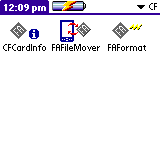 Now, you've got the hardware, but CF Cards work a little differently than the Flash Cards from Handspring. When you start using CF Cards in your Visor, it introduces the concept of File Management. Typically Palm users think of a memory upgrade as adding more "main" memory to their Palm. The storage memory and main memory of the PalmOS are shared from a user's point of view.
Now, you've got the hardware, but CF Cards work a little differently than the Flash Cards from Handspring. When you start using CF Cards in your Visor, it introduces the concept of File Management. Typically Palm users think of a memory upgrade as adding more "main" memory to their Palm. The storage memory and main memory of the PalmOS are shared from a user's point of view.
We don't usually think about memory in terms of off-loaded storage. A CF Card looks like a Disk Drive, not Main Memory. When I use a 48 Meg CF Card in my 8 Meg Visor Prism, I still have an 8 Meg Prism. But now I have 48 Megs of Storage that I can copy/move files to and from.
For example, I can store JunglePort Maps and Yellow Pages on the CF Card, but the JunglePort app can only see those Maps that are in the Visor's Main Memory. With 48 Megs I can store maps for the whole United States, but I'll need to copy those apps that I'm interested in looking at to the Visor's Main Memory. When I'm done, I'll delete them. It sounds harder than it is.
I play Astraware's Mahjongg maybe once a week, and it's quite large. I leave it on the CF Card, and copy it over to play. When I'm done, I copy it back and delete it from the Visor's Main Memory. In the future, Kopsis Engineering hopes to have an "AutoFileMover" to address and automate this
inconvenience.
All this CF versus Flash information is explained in detail from Kopsis's FAQ, but here's a snippet.
The Flash memory in Handspring's module is a type that the Dragonball processor in the Visor "knows" how to access directly. The memory looks just like conventional ROM to the CPU and as a result it can directly execute applications and read (but not write) databases that are stored there.
To the CPU, CompactFlash doesn't look like Flash at all. It looks like a disk drive. The Flash chips in a CF card are not visible to the device that the CF card is plugged into. All that the Visor can "see" is the CF controller chip, which looks exactly like a hard disk controller. Just as your PC or Mac cannot run any programs on the hard disk without first loading them into RAM, the Visor cannot access any programs on the CF card without first loading them into RAM. And unlike a desktop system, the PalmOS running on the Visor knows nothing about "loading programs". It assumes that everything it needs has already been loaded into RAM via a hotsync.
Kopsis Engineering has written Flash Adapter drivers and a suite of CF Software programs that use them.
Kopsis includes a number of .PRC Libraries that will be used when 3rd party applications begin to support CF on the Visor. They also install three applications - CFCardInfo, FAFileMover, and
FAFormat.
The three Applications >>